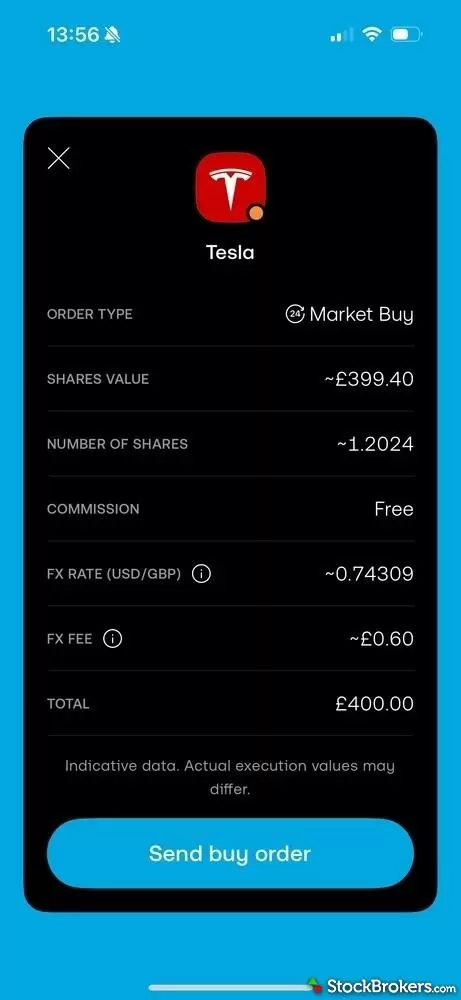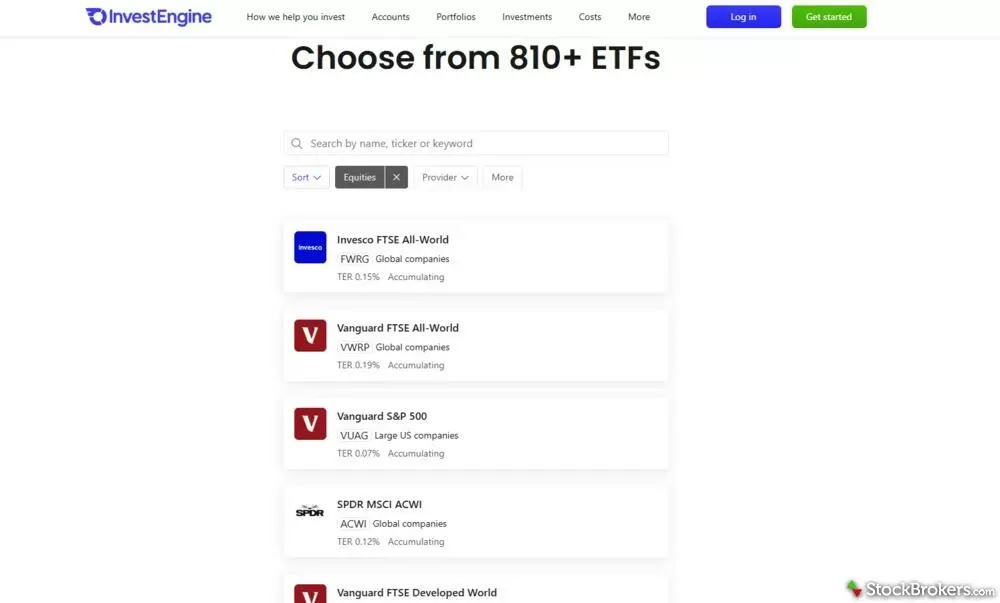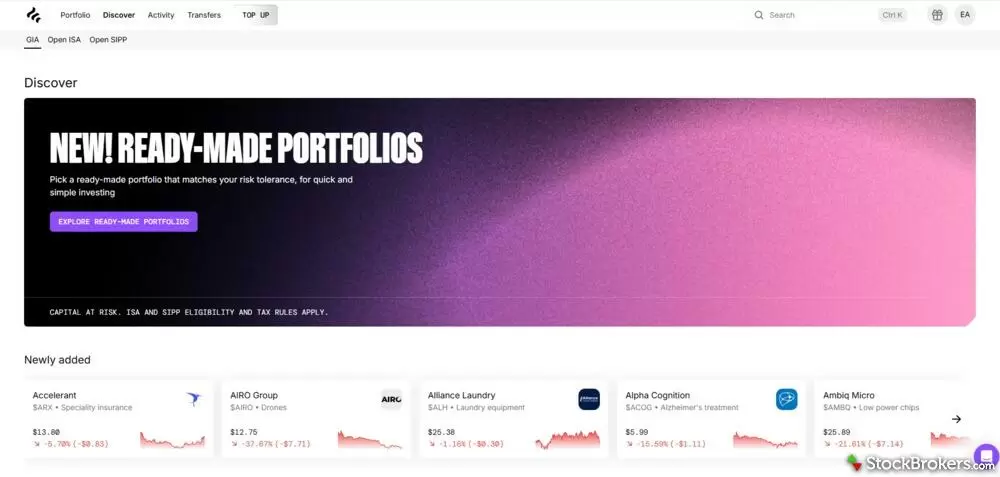Best UK Trading Platforms for Beginners of 2026
Led by Elizabeth Anderson, Lead Writer and Researcher, the UK.StockBrokers.com research team collects data and tests products on an ongoing basis. We review the tools and features most important to U.K. investors – including beginners, casual investors, passive investors, and active traders.
We collect and track data on trading charges, fees, and interest rates to make it easier to understand the cost of investing in the U.K. We analyze a wide range of savings and investment offerings, like ISAs, SIPPs, investment portfolios, pensions, and active trading accounts. We hand-collect and audit data across more than 50 variables in our coverage of the best U.K. investment platforms.
Our researchers open personal brokerage accounts and test all available platforms on desktop, web, and mobile for each broker reviewed on UK.StockBrokers.com. Learn more about how we test.
As a beginner investor, you may be overwhelmed by the choice of platforms and investments out there; there are around 20 investment platforms in the U.K. and several thousand investment choices spanning stocks and shares, exchange-traded funds (ETFs), mutual funds, and investment trusts.
I’ve reviewed over 20 of the biggest investment platforms in the U.K., gathering nearly a thousand data points across dozens of variables in the process. Of course, there’s no single “perfect” choice: the best trading platform for you will depend on your budget, how hands-on you want to be, and whether you prefer a simple app or a more advanced desktop experience.
In this guide, I’ll walk you through my top picks, explain what sets them apart, and help you choose a platform that makes getting started with investing and trading as straightforward as possible.
Best UK Trading Platforms for Beginners
The platforms below consistently deliver the strongest overall experience for new investors, balancing low costs, ease of use, educational support, and reliable mobile apps, all while operating under FCA regulation.
- Minimum Deposit: £1
- Share Trading: 0-9 Deals/ Month: £0
- ISA: Yes
- SIPP: No
Trading 212 offers fractional shares, meaning you can commit less money when starting out. You can open an account with just £1. New investors will likely want the ‘Invest’ or ISA account rather than the high-risk CFD account. Read full review
- Tax-free investing via an ISA.
- High interest rate on cash balances.
- User-friendly mobile app with practice accounts available.
- Commission-free stock and ETF trading, including fractional shares.
- Doesn't offer a SIPP.
- Limited educational materials when researching investments.
- Only offers stocks and ETFs; does not offer mutual funds or bonds.
- Minimum Deposit: £100
- Share Trading: 0-9 Deals/ Month: N/A
- ISA: Yes
- SIPP: Yes
InvestEngine specialises in ETFs, a type of low-cost investment fund allowing you to invest in a wide range of shares, bonds, gold, and more. InvestEngine does not charge any account fees for DIY investors, but there is a small 0.25% charge for its managed funds.
- 800+ global ETFs.
- No platform fees or trading commission for the DIY portfolio.
- Managed portfolios are available for just 0.25% annual fee.
- Supports ISA and SIPP tax wrappers.
- Unique feature of multiple, named investment pots.
- Limited to ETF investing only.
- Doesn’t offer junior ISAs or junior SIPPs.
- Uninvested cash doesn’t earn interest.
- Trades are executed only once a day.
- Transfers out must be in cash.
- Minimum Deposit: £1
- Share Trading: 0-9 Deals/ Month: £0
- ISA: Yes
- SIPP: Yes
Overall Freetrade is a great platform to help you get to grips with investing. Costs are low, and its user-friendly mobile app offers great investment inspiration. Sophisticated investors, however, may find that other platforms offer a wider range of investment options and tools. Read full review
- Commission-free trading keeps costs low for beginners.
- Fractional U.S. shares let you invest with just a few pounds.
- User-friendly mobile app makes stock discovery simple and engaging.
- £5.99 monthly ISA fee adds up on smaller portfolios.
- Missing core investments like mutual funds and bonds.
- Minimal research tools makes it tough for deeper analysis.
- Minimum Deposit: £1
- Share Trading: 0-9 Deals/ Month: £9.50
- ISA: Yes
- SIPP: Yes
Lloyds Bank is a U.K. investment platform best known for its simple, low-cost investing options, support for ISAs and SIPPs, and appeal to long-term, hands-off investors. Read full review
- Wide range of investments, including bonds and mutual funds.
- Can invest via ISA, SIPP, or taxable account.
- Flat £40 fee is great value for larger portfolios.
- No trading fee for U.S. shares and free regular investing.
- Difficult and time-consuming to open an account.
- £11 per trade for U.K. stocks is expensive.
- Very limited tools and research.
- No interest paid on uninvested cash.
- Minimum Deposit: £0
- Share Trading: 0-9 Deals/ Month: £0
- ISA: Yes
- SIPP: Yes
IG is an investment platform aimed at experienced investors looking to make frequent trades on the stock market, with thousands of shares, trusts and ETFs to trade. It offers a comprehensive and easy-to-use trading platform that is used by both private and professional investors. Read full review
- Trade 11,000+ shares, trusts, and 2,000 ETFs with £0 commission.
- Pays 4.5% interest on uninvested cash balances.
- Invest via an ISA or SIPP.
- One of the best U.K. stock trading apps for active traders.
- No mutual funds, bonds, or demo account for share trading.
- Chart tools are limited unless on Pro or £30/month plan.
- £8/month custody fee unless you make three trades/quarter.
Your capital is at risk.
Other trading platforms I tested
6. AJ Bell - Retirement investing
| Company | Overall Rating | Minimum Deposit | Ease of Use | Mobile App |
 AJ Bell AJ Bell
|
|
£250 |
|
|
AJ Bell offers everything from shares and investment trusts to mutual funds and bonds. In addition to a standard investment ISA, AJ Bell is one of the few investment platforms in the UK to offer a Lifetime ISA for investors saving for their first home or retirement. If you plan to invest in shares or ETFs, be mindful of fees that can take a large chunk out of your investment if you are only buying a small amount. AJ Bell charges £5 each time you buy or sell shares, reduced to £1.50 for regular trading. Management fees are also charged, capped at £3.50 per month.
7. Interactive Investor - Best for large portfolios
| Company | Overall Rating | Minimum Deposit | Ease of Use | Mobile App |
 Interactive Investor Interactive Investor
|
|
£1 |
|
|
Interactive Investor (ii) is best for hands-on investors with medium-to-large portfolios who want predictable costs and a deep investment lineup. Its flat monthly pricing can work out cheaper than percentage-based fees once your portfolio grows, and it supports ISAs and SIPPs alongside shares, ETFs, funds, and bonds. The web platform is strong for research and charting, but ii can be pricey for smaller accounts, and it still charges £3.99 per fund trade.
8. Interactive Brokers - Global market investing
| Company | Overall Rating | Minimum Deposit | Ease of Use | Mobile App |
 Interactive Brokers Interactive Brokers
|
|
£0 |
|
|
Interactive Brokers (IBKR) is best for experienced investors and frequent traders who want deep global market access and low costs. You can trade across 90+ markets with strong mobile and web tools, plus very low FX fees (about 0.03%) and fractional shares from $1. However, the platform can feel complex for beginners, and its ISA comes with a £3/month minimum activity fee unless you generate at least that much in trading commissions.
9. XTB - Commission-free share trading
| Company | Overall Rating | Minimum Deposit | Ease of Use | Mobile App |
 XTB XTB
|
|
£0 |
|
|
XTB is best for fee-conscious beginners who want a free ISA and an all-in-one investing app. You can trade stocks and ETFs commission-free (up to €100,000/month) and earn 4.25% interest on uninvested GBP cash, which is unusually competitive. The main drawback is usability: because XTB still caters heavily to CFD traders, the platform can feel cluttered and confusing, and it doesn’t offer mutual funds, bonds, or a SIPP.
10. Hargreaves Lansdown - Best for long-term investors
| Company | Overall Rating | Minimum Deposit | Ease of Use | Mobile App |
 Hargreaves Lansdown Hargreaves Lansdown
|
|
£100 |
|
|
Hargreaves Lansdown is best for all-in-one investing, especially ISAs and family accounts. It offers one of the widest investment selections in the U.K., plus strong guidance, ready-made portfolios, and standout wrappers like Junior ISAs and Lifetime ISAs. The trade-off is cost: one-off share and ETF dealing is £11.95 per trade, which can be expensive for small, infrequent investors. Regular investing helps reduce dealing fees to £0.
Compare the best UK trading platforms for beginners
| Company | Overall Rating | ISA | SIPP | Share Trading: 0-9 Deals/ Month |
 Trading 212 Trading 212
|
|
Yes | No | £0 |
 InvestEngine InvestEngine
|
|
Yes | Yes | N/A |
 Freetrade Freetrade
|
|
Yes | Yes | £0 |
 Lloyds Bank Lloyds Bank
|
|
Yes | Yes | £9.50 |
 IG IG
|
|
Yes | Yes | £0 |
Popular Guides
Popular Stock Broker Reviews
More Guides
- Best Cash ISA Accounts & Rates for 2026
- Best Crypto Brokers & Apps for February 2026
- Best SIPP Providers of 2026
- 5 Best Demo Trading Accounts in the UK for 2026
- Best Stocks and Shares ISAs for 2026
- Best Lifetime ISAs of 2026
- Best Junior SIPPs for 2026





